RiverWest project near Spirit Mountain wins road approval
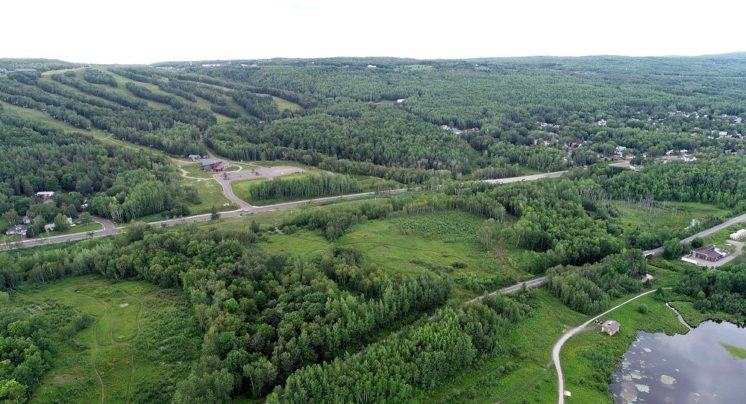
The site of the planned RiverWest development is at the foot of Spirit Mountain, between Grand Avenue and the BNSF Railroad tracks. (Photo by Liftoff Aerials)
An ambitious but long-dormant redevelopment project designed for outdoor enthusiasts received a jumpstart last week when city officials authorized new road construction below Spirit Mountain Recreation Area.
The Duluth City Council approved an agreement July 20 with Spirit Valley Land Company to build a road with utilities extending south across Grand Avenue from the Spirit Mountain parking lot. The new RiverWest Drive — also referred to in plans as Kayak Bay Drive — will access 26 acres of land for housing, retail and lodging construction.
Spirit Valley Land Company began planning more than 10 years ago to develop 85 acres of unused property in Duluth’s Riverside neighborhood. The RiverWest project is a housing and retail component designed to attract active residents who would ski, bike and kayak at nearby Spirit Mountain, the Willard Munger State Trail and a potential future city park along the St. Louis River called Kayak Bay Park.
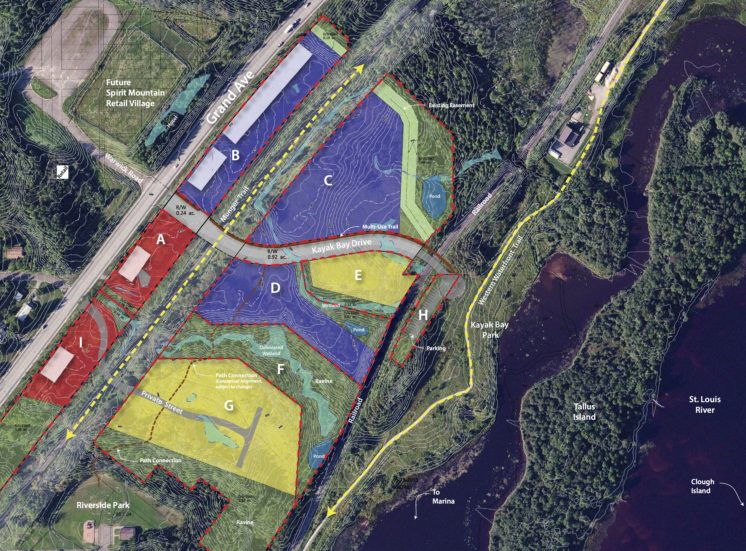
City plans show housing, retail and other commercial development on 26-acres between Grand Avenue and the St. Louis River.
Spirit Valley Land Company Chief Manager Brad Johnson said the project has been reduced over the years and slowed by complicated negotiations between the city, St. Louis County, the Minnesota Department of Natural Resources and BNSF Railway, which operates tracks below Grand Avenue. While a railroad crossing still needs to be finalized, the new city agreement means plans can begin moving forward.
“We can’t sell anything without a road, sewer and water,” said Johnson. “That’s the first step.”
Johnson and his partners are putting together a $1-million site-grading plan that includes county and state money. The grading should be complete by the end of fall or early spring. Road construction should start next summer with completion by fall of 2021. A stop light and pedestrian crossing on Grand Avenue is part of the plan.
“At that time a lot of the grand ideas that we have can start to be in place,” he said. “It allows us at this point in the game to start marketing.”
Spirit Valley Land Company is seeking a developer to complete the project. Plans call for between 200-250 apartment units and 40-50 homes on the site. A hotel at the base of Spirit Mountain is in the original plan along with retail shops and a winery, but Johnson said those plans have changed due to COVID-19, the economic downturn and partnership moves.
Johnson, based in Chanhassen, has worked in Duluth for decades. He led the Kenwood Village development on Arrowhead Road three years ago. While West Duluth economic conditions are more difficult than the east side of town, Johnson said the RiverWest location is perfect for outdoor recreation.
“This is one rare place where you can have your kayak down by the water — just go down and grab it. Go skiing. Go biking. Go running. There’s nothing you can’t do there,” he said.
Spirit Valley Land Company partner and Duluth Ski Hut owner Scott Neustel said he was relieved an agreement has been reached and excited to see road construction begin below Grand Avenue.
“We view this as a fabulous connection to Spirit Mountain, the Munger Trail and the waterfront trail,” Neustel said. “It can only benefit that area. The base of Spirit Mountain is the ideal place for development, certainly not at the top.”
Original Spirit Valley Land Company plans called for housing above Grand Avenue and west of Spirit Mountain. Those plans were tabled after Spirit Mountain created the Grand Avenue Nordic Center in 2018, installed new snowmaking infrastructure and called for more parking space, he said.
Neustel said the new Grand Avenue stop light crossing will connect the Spirit Mountain recreation trails to the RiverWest neighborhood with its restaurants, coffee shops and retailers.
While not part of the development, a city park with a St. Louis River kayak landing has been considered for the area. The RiverWest road could cross BNSF railroad tracks and access the park but a crossing easement would add to park construction costs. The RiverWest road plan currently stops at the tracks.
The new park and landing were opposed by some neighborhood residents and both the parks commission and city council were divided on the plan two years ago.
Duluth City Council member Joel Sipress told councilors July 20 the park project is separate from the road and RiverWest development. He said the city might have other, lower-cost options for a non-motorized boat landing on the St. Louis River waterway.
“I’m in favor of going ahead with this road,” he told the council. “And perhaps reconsider whether or not the paddle launch makes sense financially given other priorities.”
Neustel said the landing would be the first of its kind on the Minnesota side of the river. It would provide relief for other boat landings, separate motor and paddle boat users and support a planned St. Louis River national water trail.
“That’s a pretty big deal,” he said. “We’re hoping it comes to fruition.”
Deputy Director of Planning and Economic Development Adam Fulton said the city parks department is in negotiations with BNSF Railway and it remains unclear if the road will cross the tracks and if a park and landing will be established on the river.
“There’s been a lot of focus on the river aspect because at one time that was an extremely high priority. At this time, I can’t really speak to whether it is or is not a high priority,” he said. “What I can say about it is we have not concluded the land transaction with BNSF.”
Fulton said the city was eager to see the road construction begin. He said approximately $900,000 in grant funds from St. Louis County and the state of Minnesota will be used to build the road and the Grand Avenue traffic signal.
The project has been under consideration for more than 10 years and has undergone environmental evaluations and has full planning entitlements, he said.
“We’re enthusiastic about having some development in this location, it’s been long planned,” said Fulton.

A historic map shows a 9-hole golf course east of the Riverside neighborhood. (Map courtesy of Zenith City Online).
Duluth historian and Zenith City Online publisher Tony Dierckins said the area was once owned by McDougall Duluth — later Barnes Duluth — a shipbuilding company that established Riverside. Dierckins said it appears a private group constructed a 9-hole golf course east of the neighborhood in 1919. The club operated until 1945.
Neustel said redeveloping the area is long overdue.
“All these trails have been developed over the years here but there’s very few amenities,” he said. “You go for a bike ride and you want to sit down and have a bite to eat — there’s the Tappa Keg and some others in West Duluth — but these are basically right on the trail. If you visit other areas with very active bike trails and skiing, these are the types of things that attract people.”
Recommended Links:
Leave a Comment
Only registered members can post a comment , Login / Register Here


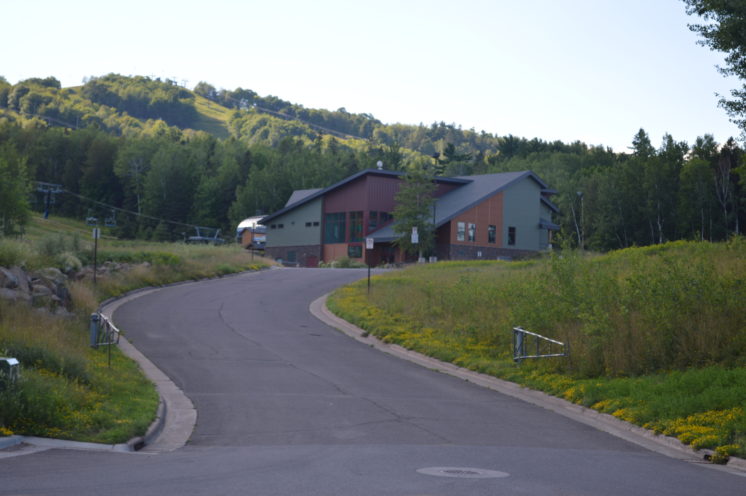
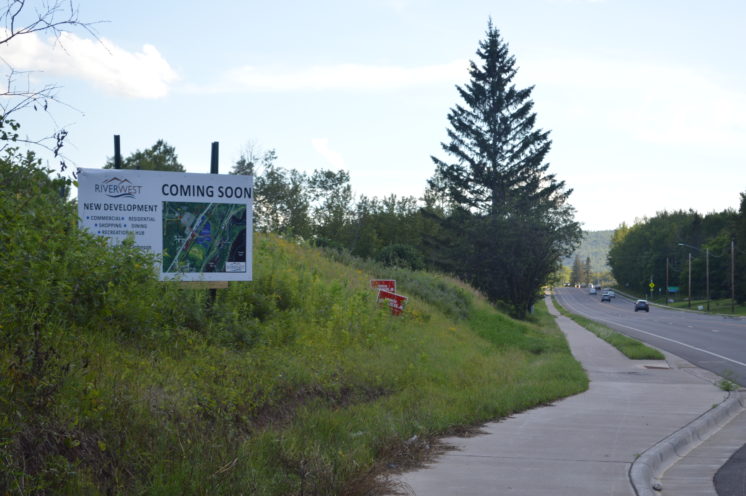



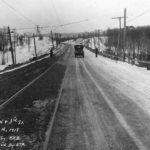








2 Comments
Ramos
about 4 years agoPaul Lundgren
about 4 years ago